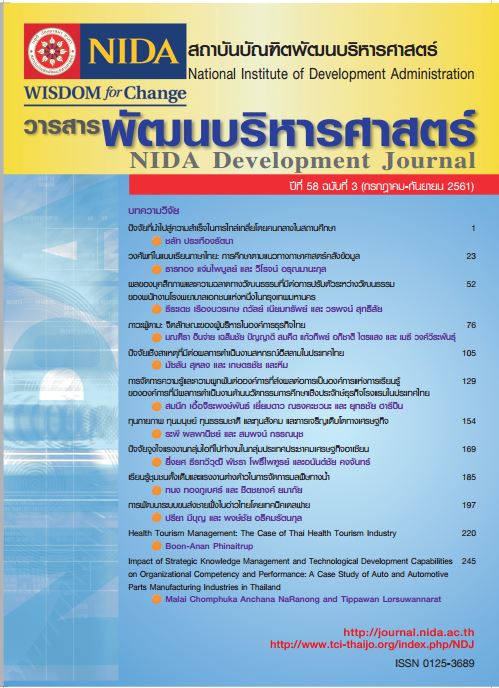Followership: Psychological Trait of Executives in Thai Business Organizations
Keywords:
followership, executives, business organizationAbstract
The objectives of this study were to identify factors that relate to followership and to propose a suitable process for followership development in Thai business organizations. The main research tool utilized was the Followership Inventory and Psychological Factors Scale (FIPFS-49) administered to 405 executives in Thai business organizations. Stepwise multiple regression analysis revealed that coping, work performance, functional competency, leadership of the superior, and organizational climate explained 68 percent of the variance in the followership of the executives (R2 = 0.68, F = 166.71, p < 0.01). These results were the focus of a discussion on the topic of effective followership development strategies with executives and workers from various levels of the Siam Cement Public Company Limited (SCG). An analysis of the group discussion suggested that a suitable process for the followership development in business organizations should focus on recruitment and selection by assessment center, training and development by on-the-job learning, motivating by open and challenge culture, maintenance by performance appraisal, and termination by corporate governance with integrity.
References
ชาย โพธิสิตา. (2554). ศาสตร์และศิลป์แห่งการวิจัยเชิงคุณภาพ. พิมพ์ครั้งที่ 4. กรุงเทพฯ :
อมรินทร์พริ้นติ้งฯ.
ทรงกลด เจริญศรี และ มาริสา ไกรฤกษ์. (2550). ความสัมพันธ์ระหว่างสติปัญญาทางอารมณ์กับภาวะผู้นำและภาวะผู้ตามของพยาบาลวิชาชีพโรงพยาบาลทั่วไป เขต 11 ภาคตะวันออกเฉียงเหนือ กระทรวงสาธารณสุข. วารสารวิจัย มข. (บศ.) 7(2), 70-82.
บุญธรรม กิจปรีดาบริสุทธิ์. (2553). สถิติวิเคราะห์เพื่อการวิจัย. กรุงเทพฯ : เรือนแก้วการพิมพ์.
พรจันทร์ เทพพิทักษ์. (2548). ความสัมพันธ์ระหว่าง ภาวะผู้นำการเปลี่ยนแปลงของหัวหน้าหอผู้ป่วย ภาวะผู้ตาม ที่มีประสิทธิผลของพยาบาลประจำการ กับประสิทธิผลของหอผู้ป่วยตามการรับรู้ของพยาบาลประจำการ โรงพยาบาลรัฐ กรุงเทพมหานคร. กรุงเทพฯ : วิทยานิพนธ์มหาบัณฑิต สาขาวิชาพยาบาลศาสตร์ (การบริหารการพยาบาล), จุฬาลงกรณ์มหาวิทยาลัย.
มณฑิรา อินจ่าย. (2558). ภาวะผู้ตาม: จิตลักษณะของผู้บริหารในองค์การธุรกิจ. เชียงใหม่ : ดุษฎีนิพนธ์ สาขาวิชาบริหารศาสตร์ (การศึกษาเพื่อบริหารทรัพยากรมนุษย์), มหาวิทยาลัยแม่โจ้.
รังสรรค์ ประเสริฐศรี. (2548). พฤติกรรมองค์การ (Organization Behavior): แบบทดสอบ & การประยุกต์ใช้ทฤษฎีพฤติกรรมองค์การ [Test and Organizational Behavior (OB) application]. กรุงเทพฯ : ธรรมสาร.
ลดาวัลย์ ปฐมชัยคุปต์. (2545). ความสัมพันธ์ระหว่างการใช้ภาษาในการจูงใจของหัวหน้าหอผู้ป่วย การทำงานเป็นทีม การพยาบาล ภาวะผู้ตามที่มีประสิทธิผลของพยาบาลประจำการกับประสิทธิผลของหอผู้ป่วยโรงพยาบาลศูนย์. กรุงเทพฯ : วิทยานิพนธ์มหาบัณฑิต สาขาวิชาพยาบาลศาสตร์ (การบริหารการพยาบาล), จุฬาลงกรณ์มหาวิทยาลัย.
วิสัยทัศน์เอสซีจี: คนของเรา... เติบโตไปพร้อมกัน. (2551). สืบค้นเมื่อ 15 มีนาคม 2556 จาก http://www.scg.co.th/th/01corporate_profile/02_scg_vision_03.html
ศิระ จุลานนท์. (2551). แบบภาวะผู้ตามของข้าราชการทหารชั้นสัญญาบัตร ชั้นยศพันตรีหรือเทียบเท่าและต่ำกว่า ในสำนักนโยบายและแผนกลาโหม. ชลบุรี : ปัญหาพิเศษ
สาขาวิชารัฐประศาสนศาสตรมหาบัณฑิต, มหาวิทยาลัยบูรพา.
สิริอร วิชชาวุธ. (2549). จิตวิทยาอุตสาหกรรมและองค์การเบื้องต้น. พิมพ์ครั้งที่ 2. กรุงเทพฯ : สำนักพิมพ์มหาวิทยาลัยธรรมศาสตร์.
สุชาติ ประสิทธิ์รัฐสินธุ์. (2540). เทคนิคการวิเคราะห์ตัวแปรหลายตัวสำหรับการวิจัยทางสังคมศาสตร์และพฤติกรรมศาสตร์ : หลักการ วิธีการ และการประยุกต์. พิมพ์ครั้งที่ 4.
กรุงเทพฯ : โรงพิมพ์เลี่ยงเชียง.
สุเทพ พงศ์ศรีวัฒน์. (2548). ภาวะผู้นำ ทฤษฎีและปฏิบัติ: ศาสตร์และศิลป์สู่ความเป็นผู้นำที่สมบูรณ์. ฉบับปรับปรุงครั้งที่ 2. กรุงเทพฯ : วิรัตน์ เอ็ดดูเคชั่น.
อริยา คูหา. (2546). แรงจูงใจและอารมณ์. สงขลา: ภาควิชาจิตวิทยาและการแนะแนว คณะศึกษาศาสตร์ มหาวิทยาลัยสงขลานครินทร์.
Agho, A. (2009). Perspectives of Senior-Level Executives on Effective Followership and Leadership. Journal of Leadership and Organizational Studies 16, 2: 159–166.
Aliabadizadeh, S. (2009). An Examination of Followership Traits in Iranian Small Firm Performance. Master thesis, Universiti Utara Malaysia.
Bjugstad, K., Thach, E. C., Thompson, K. J. & Morris, A. (2006). A Fresh Look at Followership: A Model for Matching Followership and Leadership Styles. Journal of Behavioral and Applied Management 7(3), 304-319.
Blackshear, P. B. (2004). The Followership Continuum: A Model for Increasing Organizational Productivity. The Innovation Journal 9(1), 1-16. Retrieved April 24, 2012, from https://www.innovation.cc/discussion-papers/blackshear-emp.pdf
Carsten, M., Uhl-Bien M., West B., Patera J. & McGregor R. (2010). Exploring Social Constructions of Followership: A Qualitative Study. Leadership Quarterly 21: 543–562.
Crossman, B. & Crossman, J. (2011). Conceptualising Followership - A Review of the Literature. Leadership 7(4), 481–497.
Greyvenstein, H. & Cilliers, F. (2012). Followership’s Experiences of Organisational Leadership: A Systems Psychodynamic Perspective. SA Journal of Industrial Psychology 38(2), 1-10. Retrieved February 6, 2013, from http://dx.doi.org/10.4102/sajip.v38i2.1001
Jordan, J. P. (2009). An Investigation of Exemplary Acts of Followership: A Multiple Case Study Design. Doctoral dissertation, Minnesota: University of St. Thomas.
Kelley, R. (1992). The Power of Followership: How to Create Leaders People Want to Follow and Followers Who Lead Themselves. New York: Doubleday.
Lawshe, C.H. (1975). A Quantitative Approach to Content Validity. Personnel Psychology 28: 563-575.
Naresuan University Library - One Search. (2014). “Followership”. Retrieved March 31, 2014, from http://eds.a.ebscohost.com/eds/results?sid=2e61c2e2-a513-44ec-bd63-873783467f74%40sessionmgr4005&vid=4&hid=4113&bquery=followership&bdata=JnR5cGU9MCZzaXRlPWVkcy1saXZl
Satir, V., Banmen, J., Gerber, J. & Gomori M. (1991). The Satir Model: Family Therapy and Beyond. California: Science and Behavior Books.
Seelay, T. A. (2006). The Impact of Followership Dimensions on Affective Commitment and In-Role and Extra-Role Performance. Doctoral dissertation, California: Alliant International University.
Wang, P. & Cameron A. (2012). Searching for the Successful Hospitality Follower: A Case Study in Followership. Proceedings of the New Golden Age of Tourism and Hospitality, 6-9 February 2012. Melbourne: La Trobe University.
Translated Thai References
Ministry of Commerce, Department of Business Development. (2014). Juristic Person Registration in January 2014. Retrieved February 19, 2014, from http://www.dbd.go.th/download/document_file/Statisic/2557/ H99_201401.pdf (InThai)
Podhisita, Chai. (2011). Sciences and Arts of Quality Research (4th ed.). Bangkok: Amarin Printing. (InThai)
Charoensri, Songklod & Krairiksh, Marisa. (2007). The Relationships among Emotional Intelligence, Leadership and Followership of Professional Nurses in General Hospitals, Northeast Region 11, under The Ministry of Public Health. KKU Research Journal (Graduate Studies),7(2),
70-82. (InThai)
Kijpredarborisuthi, Boontham. (2010). Statistical Analysis for Research. Bangkok: Reunkeaw Printing. (InThai)
Theppitak, Pornjun. (2005). Relationships between Transformational Leadership of Head Nurses, Effective Followership of Staff Nurses and Effectiveness of Patient Units as Perceived by Staff Nurses, Governmental Hospitals, Bangkok Metropolis. Master’s thesis, Chulalongkorn University. (InThai)
Injai, M. (2015). Followership: Psychological Trait of Executives in Business Organizations. Doctoral dissertation. Maejo University. (InThai)
Prasertsee, Rungsan. (2005). Organization Behavior: Test and Organizational Behavior (OB) application. Bangkok: Dharmasarn. (InThai)
Pathomchaikupt, Ladawan. (2002). Relationship between Motivating Language of Head Nurses, Nursing Teamwork, Effective Followership of Staff Nurses, and Effectiveness of Patient Units, Regional Hospital and Medical Centers. Master’s thesis, Chulalongkorn University. (InThai)
SCG VISION: Our People... Growing Together. (2008). Retrieved March 15, 2013, from http://www.scg.co.th/th/01corporate_profile/02_scg_vision_03.html (InThai)
Chulanont, Sira. (2008). Followership Type of Commissioned Officer at Major Level and Lower in Office of Policy and Planning, Ministry of Defence. Special Problems, Graduate School of Public Administration, Burapha University. (InThai)
Wichawut, Siriorn. (2006). Foundation of Industrial and Organizational Psychology (2nd ed.). Bangkok: Thammasat University Publishing. (InThai)
Prasit-rathasint, Suchart. (1997). Multivariate Analysis Technique for Social Sciences and Behavioral Sciences Research: Principle, Method, and Application (4th ed.). Bangkok: Liangchiang. (InThai)
Pongsriwat, Suthep. (2005). Leadership Theories and Practices: Sciences and Art to be Perfectly Leadership (2nd ed.). Bangkok: Virat Education. (InThai)
Kuha, Ariya. (2003). Motivations and Emotions. Songkla: Depatment of Psychology and Guidance, Faculty of Education, Prince of Songkla University. (InThai)
Downloads
Published
How to Cite
Issue
Section
License

This work is licensed under a Creative Commons Attribution-NonCommercial-NoDerivatives 4.0 International License.





